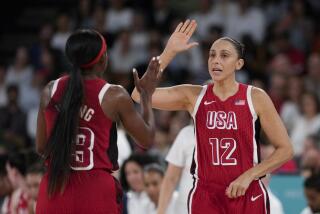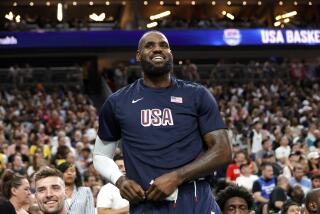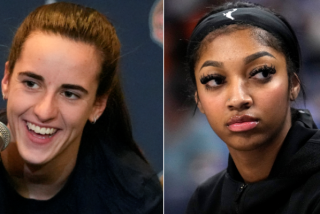Outside Influence
AUBURN HILLS, Mich. — Chiara Zanini of Milan, Italy, one of 160 media representatives from outside the United States assigned to cover the NBA Finals, unabashedly admits that before she became a journalist, she hung posters of NBA stars on her bedroom walls.
“You are the perennial showtime to us,” she said last week.
The world’s fascination with the NBA and its marquee players has fueled Commissioner David Stern’s vision for increasing the league’s international popularity, which crystallized in 1992 with the introduction of the Dream Team at the Barcelona Olympics. Regular-season games now are played in Japan, with exhibitions and clinics staged in virtually every corner of the world.
“Globalization is a huge opportunity for us,” said Stern, who last year called basketball a “universal language about to bloom on a global basis.”
The proliferation of cable and satellite outlets all but guarantees that the NBA’s TV ratings in the U.S. will never again approach the league’s heyday when it featured superstars Magic Johnson, Larry Bird and Michael Jordan -- U.S. ratings for the Finals have fallen by about half since peaking in 1998 -- but Stern sees room for growth everywhere else.
He sees it in terms of international television and marketing, foreign stars continuing to add luster to the NBA and, ultimately, expansion to Europe.
This year’s Finals, matching the Lakers and Detroit Pistons and continuing with Game 5 tonight at Auburn Hills, Mich., will reach fans in 205 countries with broadcasts in 39 languages, the NBA says. For the first time, the championship series is being broadcast in Armenian, Belorussian, Georgian, Lithuanian, Norwegian, Swedish and Polish.
As much as 20% of the NBA’s $900 million in annual TV revenue reportedly is generated from foreign rights. More than half the hits on the NBA’s website originate outside the United States, the NBA says. About 20% of NBA merchandise is sold internationally, a figure the league expects to someday exceed 50%. And NBA TV, the 24-hour television network launched by the league in 1999, is available in 39 countries.
The other U.S. sports leagues also have made inroads internationally: The NFL operates a league in Europe; Major League Baseball opened its season in Japan this year; and the NHL has watched its international TV revenue triple over the last decade. But the NBA was at the forefront in its globalization efforts.
“Basketball is the second-most popular sport in the world, so that obviously has impacted it,” said Larry McCarthy, a sports marketing expert at the Center for Sport Management at Seton Hall University. “But in fairness to the NBA, they’ve been more proactive than the other leagues in terms of understanding where they are and understanding the popularity of their product.”
The NBA has been thinking globally almost from the day Stern took over as commissioner 20 years ago. In 1986, the NBA became the first U.S. sports league to launch international TV distribution rights and operations. In 1988, it began syndicating a Spanish-language game of the week.
The league has sent teams overseas for exhibition games since 1988, when the Boston Celtics played in the first McDonald’s Open at Madrid. Since then, exhibitions have been played as far afield as Italy, France, Germany, England, Russia, Israel, Mexico and the Dominican Republic.
In October, the NBA will become the first U.S. professional sports league to play in China when the Houston Rockets, featuring Chinese center Yao Ming, meet the Sacramento Kings in exhibitions at Beijing and Shanghai. The same month, the Utah Jazz will play an exhibition game in Moscow.
Stern has said the NBA eventually will expand into Europe, but he has not revealed a timetable. He indicated last week that a lack of newer arenas in Europe had delayed his plans, but he said a first step toward expansion would be for NBA teams to hold training camps in European cities, probably in the next few years.
Also adding to the NBA’s global appeal is the growing influx of foreign stars. Opening-night rosters this season included 73 international players from 34 countries and territories, among them Laker reserve Slava Medvedenko from Ukraine and Piston reserves Mehmet Okur from Turkey and Darko Milicic from Serbia and Montenegro.
“In the not-too-distant future, there’s going to be as many elite players on other continents as there are in the United States,” Stern said before the All-Star game in February at Staples Center. “Once, that was unthinkable. If I’d suggested to you that there’d be 75 international [NBA] players a decade ago, you would’ve laughed at me.
“I’m telling you, does anyone think that Yao Ming is the last great player to come out of China? With all those hundreds of millions of people there watching him?”
Besides Yao, four other international players were selected to play in this year’s All-Star game: German forward Dirk Nowitzki of the Dallas Mavericks, Canadian center Jamaal Magloire of the New Orleans Hornets, Russian forward Andrei Kirilenko of the Jazz and Serb forward Peja Stojakovic of the Kings.
“It’s the best league in the world, and you always want to see the best,” Miguel Candeias, a reporter for the national daily sports newspaper A Bola of Portugal, says of the NBA’s worldwide reach. “You never go to the Olympics to watch the 100 meters unless you know the best eight guys are in there.”
Candeias is one of the international media representatives from 27 countries covering the Finals. The All-Star game drew 325 reporters from 41 countries. By and large, the journalists trace the NBA’s rise in worldwide popularity to the first Dream Team -- which stormed unimpeded to Olympic gold while still managing to charm fans and foes along the way -- and the high-flying exploits of Jordan.
Or, as Zanini, the reporter from Milan, noted last week at Staples Center, “I always have to thank Michael for my trips to the States.”
Last month in Beijing, police were forced to cancel Jordan’s first public appearance in the city on his 2004 Asian Tour after fans trampled flower beds, blocked sidewalks, damaged a car and ripped down several billboards while angling so they could get a good view of the retired NBA legend.
When police pulled the plug on the event at Dongdan Sports Center before Jordan even arrived, the fans became angry, many shouting Jordan’s name in unison. Some had stood outside the stadium for hours, waving Jordan posters.
In Italy, which has a highly regarded professional basketball league, the NBA is dwarfed in popularity by soccer and Formula One auto racing, Zanini said, but fans of the NBA are “really kind of obsessed,” she added.
“They almost know everything, more than most Americans that I bump into,” she said, noting that fans are not deterred by late starting times for games. “They wake up in the night, they follow play by play of every game and then they go to work. And when I come back, they e-mail me and they want to know, ‘How do they dress?’ ‘Is he nice?’ ‘The girlfriend, how does she look?’ ‘What kind of drills does his coach make him do?’ They are kind of crazy. You don’t see soccer fans like that.”
In Tel Aviv, Yaron Talpaz of Sport 5 TV says he might see as many people wearing Shaquille O’Neal and Kobe Bryant jerseys as he would in Los Angeles.
“The games are live about 4 a.m.,” he said, “and nobody does ratings at those hours, so we don’t know about that. But the feeling we get is that people get up [to watch]. You sense it from a lot of website reaction. People get up.”
Oran Keren is one of those wee-hours risers.
The Tel Aviv computer engineer has been setting his alarm for 3:30 a.m. to catch the televised tipoffs a half-hour later.
“I can’t believe that I’m waking up. I feel so stupid. But then I tell myself it’s the Finals -- you have to get up,” Keren said Friday, still woozy from an early wake-up that morning.
Keren, 30, is a self-described basketball nut in a nation with its own high-quality professional basketball league and where only soccer is more popular. For him, the special allure of the NBA is plain: “The NBA is the top of the top.”
Keren plans to keep setting the alarm and downing the coffee in hopes of a Piston title. “I’m more of an L.A. Lakers hater,” he said. “I really hate them.”
Even in France, where the popularity of basketball is about on par with the appeal of soccer in the U.S., the NBA has made an impression.
For that, league executives can thank Tony Parker. As a teenager last season, the French point guard helped the San Antonio Spurs win the NBA championship.
“He’s been sort of our second locomotive after the Jordan era,” said George Eddy, a broadcaster for Canal Plus television, which has shown NBA games since 1985. “When Jordan retired, there was sort of a drop-off.
“But now, with Tony Parker winning the title last year, that has helped the NBA be discovered by a new generation of youth in France.”
Times staff writers John M. Glionna in Beijing and Ken Ellingwood in Jerusalem contributed to this report.
More to Read
Go beyond the scoreboard
Get the latest on L.A.'s teams in the daily Sports Report newsletter.
You may occasionally receive promotional content from the Los Angeles Times.










